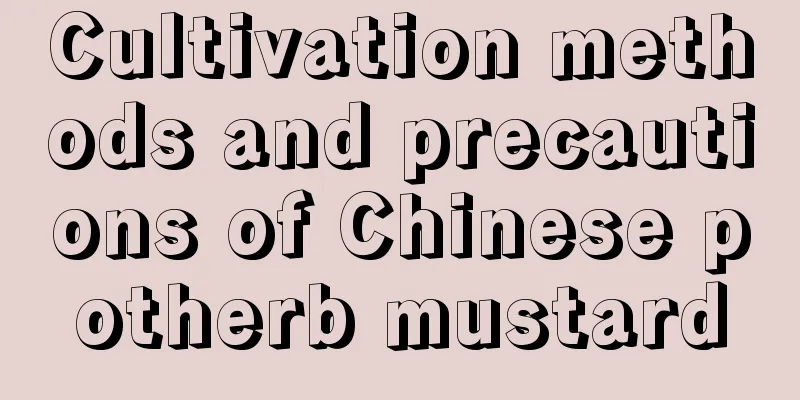Cultivation methods and precautions of Chinese potherb mustard

1. Maintenance methods1. Soil: Loose, fertile soil with good drainage is more suitable for the growth of Chinese mustard. Sandy loam can be used. 2. Water: Adequate water is essential during its vigorous growth period. The amount of watering is generally based on the standard of watering thoroughly without water accumulation. If the Chinese mustard greens do not absorb enough water, the fiber material will increase and the quality will be reduced. 3. Nutrients: Before planting Chinese mustard, the soil should be tilled and then exposed to the sun for sterilization. Then use chicken, duck, pig manure and human feces as base fertilizer and spread it evenly on the soil. This will allow the plants to fully absorb nutrients after planting. 4. Light: It likes to grow in a cooler environment with cool weather and sufficient sunshine, which is more conducive to the formation of flower buds, and can also promote the growth rate and avoid high temperatures and direct sunlight. 2. Breeding techniques1. Pruning: During the growth period, the outermost stems and leaves of the roots often wilt and rot. They should be pulled out and pruned appropriately to prevent the rotten stems and leaves from infecting the growth of other normal stems and leaves. The soil should also be loosened and weeds removed appropriately. 2. Reproduction: The general method of reproduction is direct seeding on flat beds. First, fertilize and till the soil, then sow the seeds, and sprinkle water to keep the soil moist. Seedlings will grow in about half a month. 3. Problem diagnosis and treatment1. Yellow-striped flea beetle larvae: Yellow-striped flea beetle larvae are very harmful to the roots of Chinese mustard. If not killed in time, it will seriously affect its growth. You can choose to use diluted chlorpyrifos to spray and kill it. 2. Clubroot: This is a fungal disease, which can be effectively prevented and controlled by reasonable sterilization and drug prevention. When clubroot occurs, it is very effective to use prepared lime water for watering. IV. Other issues1. How to survive the winter: Chinese mustard is a plant that can resist low temperatures. Even when the temperature is low or it snows in winter, it will not be frostbitten or frozen to death. However, when the snow is relatively thick, it should be cleared away appropriately. 2. Is it edible? Chinese mustard greens are edible. It is a common vegetable and its main purpose of cultivation in my country is for consumption. |
<<: The breeding methods and precautions of Xu Changqing
>>: Lentil cultivation methods and precautions
Recommend
How to safely overwinter Dendrobium officinale? Will Dendrobium officinale be frozen to death?
1. How to safely survive the winter 1. Ensure the...
Can the osmanthus tree bloom in winter?
1. Flowering period of the fragrant osmanthus: Fr...
Why doesn't Milan bloom?
1. Change the soil 1. Reason: Milan likes acidic ...
How to grow bitter water rose
1. Maintenance methods 1. Temperature: It is best...
How to deal with the cold of evergreen
After being taken out of the house in early sprin...
How to distinguish male and female yews? Which one is better?
1. How to distinguish between male and female 1. ...
Peanut pest control
Disease control Stem rot If peanuts are infected ...
How to prune the vine after it blooms
Pruning after flowering The fragrant vine should ...
How to grow green radish quickly
How to grow fast in soil More sun will make the p...
Is planting forsythia profitable? Planting technology and benefit analysis
Is planting forsythia profitable? Forsythia is a ...
Can the osmanthus tree be placed in the bedroom?
1. Can it be placed in the bedroom? If you want t...
Celery Planting Time and Method
Celery, as a common vegetable , is loved by peopl...
What kind of soil is suitable for planting honeysuckle
Honeysuckle has strong adaptability and is basica...
How to effectively "detoxify" after decorating a new house
Symptoms After moving into a new house, the highe...
What does jasmine look like and what does it represent?
1. What does it look like? Jasmine, also known as...









